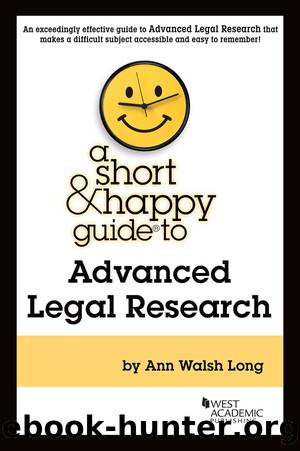A Short & Happy Guide to Advanced Legal Research by Ann Walsh Long

Author:Ann Walsh Long
Language: eng
Format: epub
ISBN: 9781640207486
Publisher: West Academic
Published: 2020-10-15T00:00:00+00:00
Limiting your search results will help identify the government agencies who collect public records and streamline your search to authoritative resources.
Trying to identify people through free public resources can be tricky. First, what is the correct spelling of the personâs full name? A general Google search might work, or Googleâs Social Search Engine, Social Searcher.8 Many people use nicknames instead of their given names, use a middle name instead of their legal first name, or have the same name as a relative. Publicly available information may not be current or complete and navigating through the free websites with inconsistent information will make your job harder.
Casetextâs Tracer,9 LexisNexis® Accurint®,10 or Westlawâs PeopleMap11 provide databases of public records that may be outside of your subscription plan, but might be worth a per search charge, if available. When you consider all of the various government entities who collect information and all the sources of information people create by and about themselves and others, you could spend a great deal of time on free web sites, compiling your own complete record. Alternatively, you could collect all of the information you need through one search, using a commercial resource. Think about doing a comprehensive criminal background search on an individual. You would need to check county records, state records, and federal records. Commercial public record services link all of the data collected by various state, local, and federal government entities together in one record. Once you find the person you are looking for, all related content is linked together. If you choose to pay for this service, the only question you need to ask is when the information was last updated.
If you are representing an individual, you have probably learned a lot about your client through what they have shared with you and the information entered on their client intake form. In addition to what you already know, you may want to research property records to verify a clientâs assets and find out if there are any liens or judgments against them. Believe it or not, your client may not always tell you everything you need to know, or may leave out critical information they did not consider necessary to share. It is never a bad idea to do some due diligence on your client. There is a wealth of information available, for free, in public records and your client intake form should have recorded their SSN. However, finding and compiling this information can often be cumbersome and time-consuming.12
Download
This site does not store any files on its server. We only index and link to content provided by other sites. Please contact the content providers to delete copyright contents if any and email us, we'll remove relevant links or contents immediately.
| Law Office Education | Law Office Marketing & Advertising |
| Law Office Technology | Legal Services |
| Paralegals & Paralegalism | Reference |
| Research |
Philosophy of law a very short introduction by Raymond Wacks(1666)
Every Landlord's Legal Guide by Janet Portman & Stewart Marcia & Ralph Warner(1663)
How Innovation Works by Matt Ridley(1641)
Writing to Win: The Legal Writer by Steven D. Stark(1588)
Drafting Contracts: How and Why Lawyers Do What They Do, Second Edition by Stark Tina L(1496)
Law Man by Shon Hopwood(1438)
Nolo's Essential Guide to Divorce by Emily Doskow(1419)
So You Want to be a Lawyer by Lisa Fairchild Jones Esq(1403)
Profit From Your Idea: How to Make Smart Licensing Deals by Attorney Richard Stim(1334)
Nolo's Encyclopedia of Everyday Law: Answers to Your Most Frequently Asked Legal Questions by Shae Irving & Nolo (Editor)(1323)
Introduction to the study and practice of law in a nutshell by Kenney F. Hegland(1320)
Garner's Modern English Usage by Bryan Garner(1244)
Nolo's Encyclopedia of Everyday Law: Answers to Your Most Frequently Asked Legal Questions by Shae Irving; Nolo (Editor)(1235)
Best Practice by J.A. Armstrong(1195)
Insight Guides Japan (Travel Guide eBook) by Insight Guides(1182)
Data Protection: A Practical Guide to UK and EU Law by Carey Peter(1139)
International Trade and Business: Law, Policy and Ethics by Gabriël Moens & Peter Gillies(1137)
Everybody's Guide to Small Claims Court by Attorney Ralph Warner (Nolo)(1040)
Credit Repair by Loftsgordon Amy(1037)
